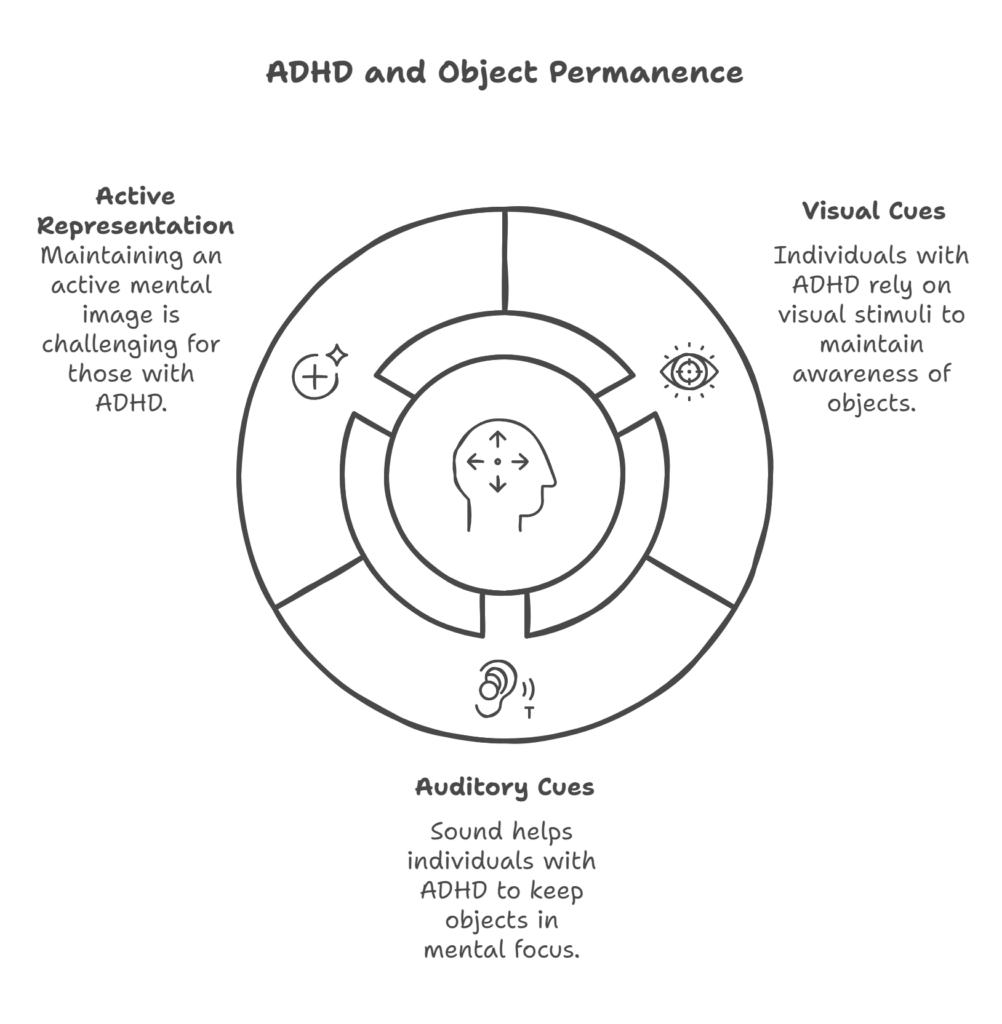Do you ever feel like your partner with ADHD forgets about you the moment you’re not around?
Does it seem like they love you deeply one day and feel distant the next?
If so, you’re not alone. Many people in relationships with ADHD partners experience this emotional disconnect.
But here’s the truth: it’s not about a lack of love, care, or commitment. It’s about how the ADHD brain processes presence, memory, and connection.
For many individuals with ADHD, out of sight can truly mean out of mind. This is called object permanence ADHD relationships, and it affects the way emotions and attachments are maintained. People with ADHD may struggle to hold on to the feeling of connection when someone is out of sight. This doesn’t mean they don’t love you; it means their brain works differently. The struggle isn’t intentional; it’s neurological.
As a partner, this can be incredibly painful. It may feel like you constantly have to remind them that you exist in their world when you’re apart. You might start questioning their love, their loyalty, and whether your relationship even matters to them. But the truth is, they care deeply; it’s just that their brain doesn’t store emotional connections the same way as neurotypical individuals.
At Relevance Recovery, we understand the challenges both partners face, and we offer therapy and support to bridge this gap. If you’ve felt unseen or forgotten in your relationship, there is hope. ADHD doesn’t have to stand in the way of deep, meaningful connections.
Object permanence is the ability to remember that something or someone exists even when they’re not physically present. Many people with ADHD struggle with this, making relationships feel unstable. This can lead to:
These behaviors can create frustration, hurt, and confusion. But once you understand the root cause, you can develop strategies to strengthen the relationship.
Many partners of individuals with ADHD feel neglected, frustrated, or even unloved. But the reality is different; ADHD affects how memories and emotions are processed, making it harder to maintain mental connections when someone isn’t physically present. Adults with ADHD often face challenges in maintaining long-term relationships and navigating conflict resolution.

Understanding these patterns can help couples move toward a more compassionate, connected relationship.
At Relevance Recovery, we help individuals and couples navigate object permanence ADHD relationships with personalized strategies that improve communication, connection, and understanding. Here’s how:
Couples therapy and ADHD treatment can help by:
Creating simple, predictable habits can help bridge the emotional gap:
At Relevance Recovery, we provide treatment programs that help individuals with ADHD develop stronger emotional connections. Some of the key treatment methods include:
ADHD may create unique challenges, but it doesn’t mean relationships have to suffer. With the right support, couples can develop stronger connections and lasting emotional security.
At Relevance Recovery, we specialize in helping individuals and couples understand and navigate object permanence ADHD relationships. Our therapists provide personalized tools and strategies to build deeper emotional bonds and create fulfilling relationships.
If you or your partner need guidance, reach out today. Healing, understanding, and connection start here. Let’s build something lasting together.
Yes, object permanence ADHD relationships can be challenging. When a person with ADHD isn’t constantly reminded of someone’s presence, they may unintentionally neglect communication, leading to feelings of distance or disconnection in relationships.
ADHD in relationships can involve forgetfulness, impulsivity, difficulty listening, and struggles with maintaining routines. However, individuals with ADHD also bring spontaneity, creativity, and deep emotional connection when properly supported.
ADHD can create misunderstandings, as partners may feel ignored or unimportant due to forgetfulness. However, with communication strategies and support, relationships can thrive despite these challenges.
People with ADHD struggle with object permanence due to working memory deficits. When someone isn’t physically present, they may unintentionally forget about them, leading to challenges in maintaining relationships.
Lack of emotional permanence means difficulty holding onto the feeling of love or reassurance when a partner isn’t actively expressing it. This can cause insecurity and require frequent affirmations to maintain stability in relationships.